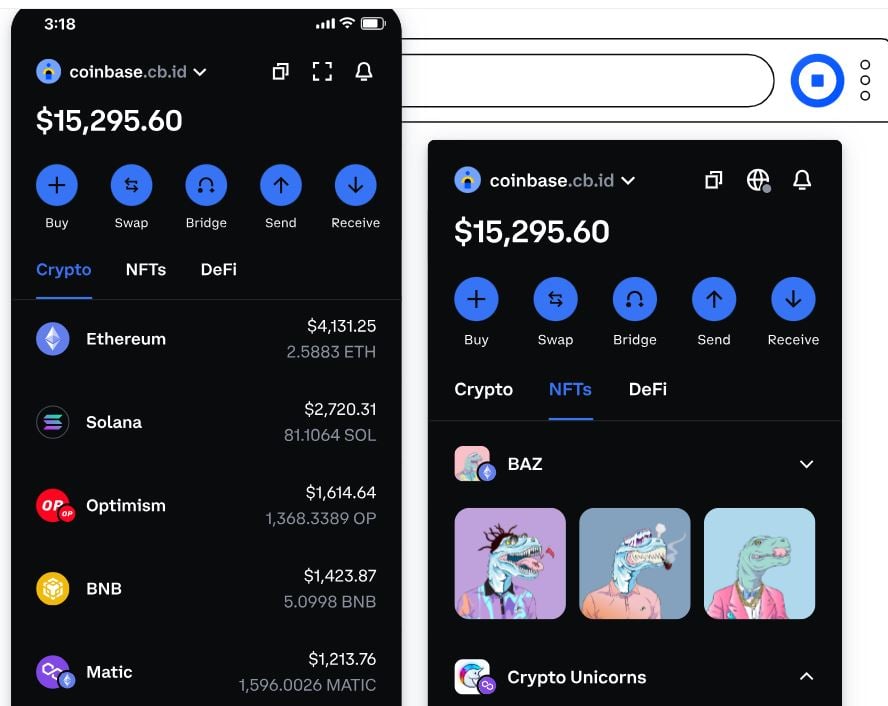In the ever-evolving world of Web3, one aspect that remains a constant is the need for functional and secure wallets. Just as the fiat economy depends on the ability to safely store your money in a bank, its decentralized counterpart relies on robust solutions for storing and interacting with digital assets.
With an ever-increasing array of options available – hardware, software, hot, cold, browser extension, mobile app – consumers can’t be faulted for their confusion. Determining which wallet best serves their needs is no easy task, which is why we’ve delved deeper and taken a close look at three prominent Web3 wallets currently available: Coinbase Wallet, Kresus SuperApp, and MetaMask. Let’s dive in.
1. Kresus SuperApp
As a relatively new player in the crowded wallet scene, the Kresus SuperApp quickly made a splash on launch, a consequence of its comprehensive suite of features and user-friendly support. The self-styled SuperApp supports a plethora of tokens and integrates a dApp explorer in-app, allowing “goof-proof” interaction with various curated DeFi projects.

A distinctive feature is Kresus’s guarantee that users will never be locked out of their account – even if they lose access to their emails. That’s because literal guardians are assigned to protect your valuables, while time-delayed withdrawals can be set for outgoing transactions. Kresus also leverages MPC (Multi-Party Computation) and Account Abstraction to offer what it calls a “premium self-custody experience,” striking a balance it believes to be “just right” for many.
As a bonus, Kresus gives every user her own free .kresus Web3 identity, powered by Unstoppable Domains, as well as the ability to mint five complimentary NFTs. Users who like their queries answered quickly, meanwhile, will be glad of the 24/7 chat and phone support offered to customers. All in all, Kresus offers a robust, easy-to-use alternative to established wallets like Coinbase and others.
2. Coinbase Wallet
As a gateway for many into the realm of cryptocurrency, Coinbase Wallet is undoubtedly one of the most popular options, a self-custody wallet notable for its user-friendly interface and broad asset support. It’s no surprise many people gravitate towards this particular wallet: the Coinbase platform has over 110 million users and a network of almost 250,000 ecosystem partners in over 100 countries. It’s not based in some far-flung tropical island either; its HQ is San Francisco.

In terms of the wallet, users store their private keys offline to retain full control of their funds and naturally, wallets can be linked to existing Coinbase accounts. A diverse range of assets are supported, from cryptocurrencies and stablecoins to NFTs (Non-Fungible Tokens), while users are able to store encrypted copies of their recovery keys on select cloud services where the backup is encrypted by AES-256 encryption.
The Coinbase Wallet isn’t without its negatives, though: transactions outside the Coinbase ecosystem incur a fee, including if you want to add funds to your Coinbase Wallet or make withdrawals. Another downside for some is the lack of a full desktop version, with the wallet only accessible via app or browser extension. Overall, though, this is a solid option that’s popular for good reason.
3. MetaMask
As a long-established, non-custodial Web3 software wallet, MetaMask is a popular option particularly with DeFi users such as traders, stakers, gamers and liquidity providers. Users can easily engage in token swaps and even stake directly from the wallet via third-party integrations, while its open-sourced codebase lets developers and end users validate its security constructs.
Although criticized in the past for its privacy features, which some users felt were substandard, MetaMask earlier this year introduced a slew of features to protect user privacy, including the ability to obscure one’s public address by selecting a different RPC node than the default Infura one. Phishing and enhanced token detection also lowered the risk of users unwittingly trying to access cloned tokens.

While MetaMask supports a huge number of ERC20 tokens, it cannot accommodate Bitcoin and also lacks a dedicated desktop application. What’s more, it doesn’t support two-factor authentication (2FA), an added layer of account protection many users like to add to their opsec. All things considered, though, this free-to-use wallet is a dependable choice, particularly if you’re only interested in ERC20s.
Final Thought
With crypto scams on the rise, choosing the right wallet is vital to keep your digital assets safe. While Coinbase Wallet, Kresus SuperApp, and MetaMask offer distinct features catering to diverse needs, users must assess their own requirements, security concerns, and functionalities to arrive at an informed decision. As the Web3 landscape continues to evolve, so will the tools and wallets that serve it, promising better, safer, and more integrated solutions that ensure the industry remains in rude health.

